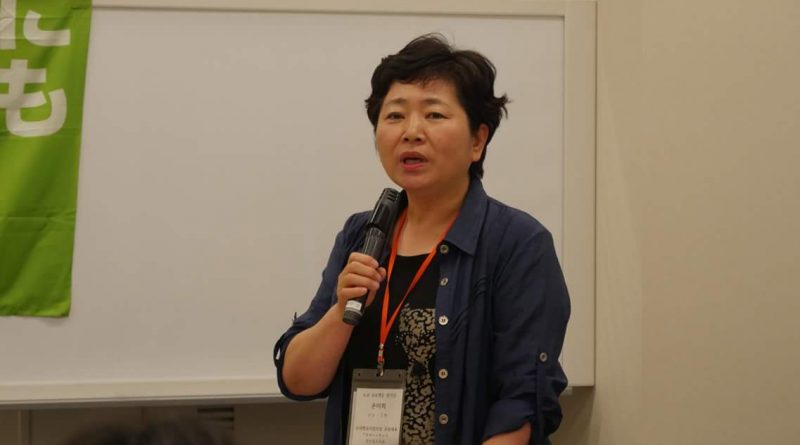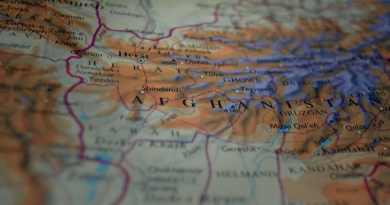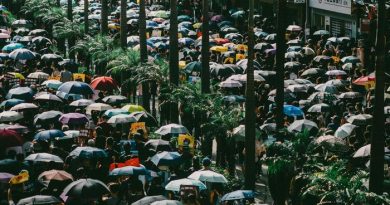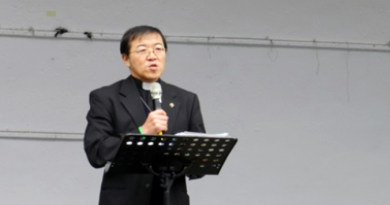Citizen’s Association Protecting our Schools and Children
- Interview with Ms. Son Mee Hee (Co-representative, Citizen’s Association Protecting our Schools and Children )
1. Tell us about the Japanese government’s discrimination against Chosun schools in Japan, the history, status, and contributions of Korean schools in Japan.
Dreaming of the day when our compatriots, who were forced to Japan during the colonial period, could return to their homeland immediately after liberation, they set up a Korean language school under the slogan, “With the power of the powerful, with the money of the rich, with the wisdom of the wise”, to protect the words, writings and history of Korean people in Japan. This is the beginning of the Chosun School.
In 1946, more than 500 schools were established, but now there are 8,000 students from 139 schools in 64 schools across Japan, ranging from Hokkaido to Kyushu, including 41 kindergartens, 53 elementary schools, 34 middle schools, 10 high schools, and 1 university.
It is the only place that can protect the national identity of Koreans in a Japanese society and is the center of the 600,000 strong Korean-Japanese community.
The Chosun School and the Korean residents in Japan have survived to today by enduring the discrimination and oppression of the Japanese, the constant threats and physical violence of right-wing groups in Japan. However, Korean schools in Japan are still subject to the Japanese government’s hostile attitude and institutional discrimination.
– As Chosun School has a status of, “schools of all sorts” (private institution like automobile training centers), it was not eligible for the discount on commuting rights. (corrected in 1994 due to persistent struggles by compatriots, such as schools and mother’s associations)
– Participation in sports competitions (football, rugby, etc.) has been restricted (step-by-step resolution in the 1990s).
– Scholarships from the Japan Student Aid Organization and the Chosun Scholarship Association are not allowed.
– Tax discrimination against school donations still exists.
– They have to raise their own education costs because they don’t receive public contributions according to their education tax payments.
– Subsidies by local governments are suspended.
– There have been delays in building earthquake-resistant construction, and monthly wages for teachers have not been paid.
– Every time tensions between North Korea and Japan escalate, there are constant threats and assaults against schools and children (such as bullying like damaging students’ uniforms with a knife).
The most despicable of all is:
On February 20, 2013, the Japanese Ministry of Education, Culture, Sports and Science promulgated and implemented an order of the Ministry that excludes Chosun School from the list of their “Free High School Education Policy.”
The policy applied to all foreign schools in Japan, international schools in the same legal position, and other Korean schools, but only Chosun Schools were excluded.
The Japanese government linked political and diplomatic matters to the issue of education, using the excuse of the strained relations between North Korea and Japan, the abduction issue and the shelling of Yeonpyeong Island.
In response, Chosun School students, parents, teachers, as well as conscientious organizations and individuals across Japan have formed a movement association against the exclusion of Chosun Schools from the “Free High School Education” policy as well as a “Group to Support the Chosun High School Lawsuit” to take the lead in the issue of Korean residents in Japan.
In Tokyo, Osaka, Aichi, Hiroshima and Kyushu, students and schools have become plaintiffs in the trial with the Japanese government, and for several years, parents and students have been on the streets to continue protest. However, since October 1, 2019, 88 schools including Chosun School kindergartens, which account for only 0.16% of all child care facilities in Japan, have been excluded from the free infant education and childcare system. Among them, 40 Korean kindergartens in Japan are eligible.
Parents of Chosunn schools are denied their right to free education, even though they fulfill their duty in paying taxes. It is a mean and despicable discrimination and oppression that even three-year-olds become a target for ethnic discrimination. However, Koreans and conscientious civil society organizations in Japan are working together to create a society without discrimination.
2. Please tell us about the “Citizen’s Association Protecting our Schools and Children (CAPSC)”, and how can we join you in the efforts to protect Chosun schools in Japan?
The CAPSC was founded to press the Japanese government to apologize for its colonial past and resist its discriminatory policy against Chosun Schools, and to promote a collective voice in Korea to support Chosun Schools.
The CAPSC emphasizes that the Japanese government’s discriminatory policies against Chosun Schools are serious human rights abuses and ethnic discrimination that violate international human rights conventions and international child protection agreements.
The CAPSC also actively promotes social and political pressure on the Japanese government by raising slogans like, “right for equal education,” “stop discrimination against ethnic minorities,” and “protect the human rights of children and adolescents”, in solidarity with different civil organizations supporting the Chosun in Japan and Korea.
Many civil organizations are members of the CAPSC: “Alternative Education Solidarity”, “Lawyers for a Democratic Society”, “Democratic Labor Council”, “Singha Buddhist Association”, “National Council of Teachers and Education Workers”, “National Council of Women’s Associations”, “National Association of Farmers”, etc.
The two main activities are sharing as widely as possible the situation of Chosun Schools and visiting Chosun Schools in Japan to express solidarity.
– Organizing regular visits to Japan to support students in person who have been protesting in front of the Education, Science and Technology Ministry
– Since December 2014, we have been carrying out a six-year “No Discrimination at Chosun School” campaign in front of the Japanese Embassy in Korea on every Friday.
– In 2019 and 2020, we re-edited the literature collection of students in Chosun Schools and published two books with a title, “Blooming Flower.”
The way to do this together is to join the “CAPSC.” You don’t have to sign up directly, but you can join us in promoting and in joining forces with us. The most precious thing is to pay close attention to our compatriots and students in the Chosun School, and to make it known to the public. Please refer to the following site:
http://bit.ly/우리학교시민모임
3. You have published the first and second volumes of “Blooming Flower”, a selection of students’ works of Chosun schools. Tell us more about the books.
“Blooming Flower” is a collection of writings by students from Chosun Schools in Japan. This project began in September 1978. The Chosun Shinbo, a newspaper of Korean residents in Japan, has started collecting writings of the students from the third grade beginner class to the third grade advanced class. Even though students were learning how to speak in Chosun Schools in a foreign land, it is still difficult to express themselves in writing, so the project began with a goal of improving writing skills of the students. Nearly 1,000 poems and compositions have been submitted from all over Japan every year. The teachers who evaluate the students’ works say that they always read them with tears in their eyes. In order to introduce these precious works of the students to the southern part of the country (South Korea), the CAPSC reorganized and edited them for a proper publication.
The first volume of Blooming Flower was published last year with the title, “We Are Chosun School Students.” It has selected 52 student writings from 2014 to 2018.
You can see the daily lives of Chosun School students, dreams of national reunification, discrimination in Japanese society, and the brave image of students facing it. When you read it, you may feel unfamiliar with words and signs, but it is because of the mixture of the words of the compatriots who have crossed over to Japan together with the North Korean language and the daily Japanese language. These strange and awkward words and expressions are proof of the efforts of Korean residents in Japan, who have worked hard to protect Korean language and writing on Japanese soil.
“Our proud school”, “History of hardship and discrimination”, “We are students of Chosun School”, “Tell the Japanese government”, “Our wishes are unification”, “Our daily lives,”- in each episode you can also listen to our compatriots’ songs through QR codes. You can also see the works of the students who won the prize at the Korean Art Exhibition in Japan.
In 2020, the second volume was published with the title, “We are Honorable Chosun People.” It is a collection of works from 1978 to 1989.
In the second volume you can experience the lives of the first generation of Koreans in which they have bitterly struggled to keep their national language and culture. Especially you can feel the passion of the students for reunification of their divided home land. In their writings, the students also express their solidarity with the people who were massacred at Kwangju in 1980.
Like the first volume, you can meet the student artists through their writings, songs, photos, and paintings, and you can see their videos through a QR code. In the era of peace and reunification, I hope that the story of Chosun School students kept by Korean residents in Japan will bloom like a flower in their southern homeland.




